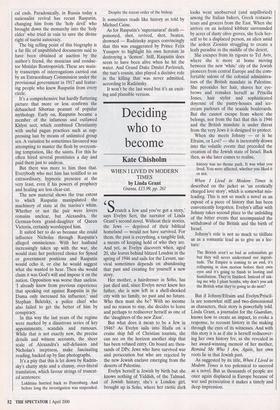A clearer but not cleaner portrait
Sam Phipps
RASPUTIN: THE LAST WORD by Edvard Radzinsky Weidenfeld, f20, pp. 503 The life and prolonged death of Grigori Efimovich Rasputin passed into legend almost as soon as his mutilated body bobbed out of an icy Petersburg river in December 1916. The Mad Monk still grips the public imagination as he did the doomed Romanovs' and his murder pre- saged not just their own demise but also the wider bloodshed under Bolshevik rule.
Rasputin's influence over the tsarina, Alexandra, his apparent power to heal the haemophiliac heir, Alexei, his rampant libido, deviousness and cunning — all have been portrayed in countless books and films, not to mention the notorious Boney M song.
Do we need another book on him? His- tory is never definitive, contrary to the clever title of Edvard Radzinsky's book, and there'll be plenty more to come on Rasputin. But this work does have one big advantage over recent rivals such as Brian Moynahan's sensationalist effort, which relied on reconstructed dialogue and spec- ulation, or Joseph Fuhrmann's biography.
Radzinsky, well-known in Russia as a playwright and the author of books on Stal- in and Nicholas II, explains that for years he was put off writing about Rasputin because
the subject smacked of pulp fiction ... At best he remained a crude bearded peasant rushing about Petrograd like some Henry Miller character with his phallus steaming.
This, he says, is because the testimony behind most studies has come from Rasputin's enemies, monarchist or Bolshe- vik, who sought to discredit him for politi- cal ends. Paradoxically, in Russia today a nationalist revival has recast Rasputin, changing him from the 'holy devil' who brought down the monarchy into the 'holy elder' who tried in vain to save the divine right of tsarist autocracy.
The big selling point of this biography is a fat file of unpublished documents said to have been obtained at auction by the author's friend, the musician and conduc- tor Mstislav Rostropovich. These are main- ly transcripts of interrogations carried out by an Extraordinary Commission under the provisional government in 1917 and featur- ing people who knew Rasputin from every circle.
It's a comprehensive but hardly flattering picture that more or less confirms the debauched Siberian peasant of popular mythology. Early on, Rasputin became a member of the infamous and outlawed Khlyst sect, which combined Christianity with useful pagan practices such as sup- pressing lust by means of unlimited group sex. A variation he sometimes favoured was attempting to master the flesh by overcom- ing temptation, like the saints. For this he often hired several prostitutes a day and paid them just to undress.
But there was more to him than that. Everybody who met him has testified to an extraordinary, hypnotic presence at the very least, even if his powers of prophecy and healing are less clear-cut.
The new material shows the true extent to which Rasputin manipulated the machinery of state at the tsarina's whim. Whether or not the pair were lovers remains unclear, but Alexandra, the German-born grand-daughter of Queen Victoria, certainly worshipped him.
It suited her to do so because she could influence Nicholas through Rasputin's alleged omniscience. With her husband increasingly taken up with the war, she would state her preferred choice for Synod or government positions and Rasputin would echo it, or else he would suggest what she wanted to hear. Then she would claim it was God's will and impose it on the nation. Opposition was worse than useless. `I already knew from previous experience that speaking out against Rasputin in the Duma only increased his influence,' said Stephan Beletsky, a police chief who also failed to get the better of him by conspiracy.
In this way the last years of the regime were marked by a disastrous series of key appointments, scandals and rumours. While that is not exactly new, the precise details and witness accounts, the sheer scale of Alexandra's self-delusion and Nicholas's ineptness, make fascinating reading, backed up by fine photographs.
It's a pity that this is let down by Radzin- sky's chatty style and a clumsy, over-literal translation, which favour strings of truncat- ed sentences:
Lokhtina hurried back to Petersburg. And before long the investigation was suspended. Despite the recent order of the bishop.
It sometimes reads like history as told by Michael Caine.
As for Rasputin's 'supernatural' death poisoned, shot, revived, shot, beaten, drowned — Radzinsky argues convincingly that this was exaggerated by Prince Felix Yusupov to highlight his own heroism in destroying a 'demon'. Still, Rasputin does Seem to have been alive when he hit the water. And Grand Duke Dmitri Pavlovich, the tsar's cousin, also played a decisive role in the killing that was never admitted, according to Radzinsky.
It won't be the last word but it's an excit- ing and plausible version.























































































 Previous page
Previous page